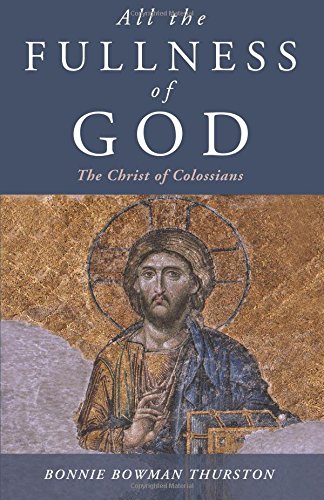
A Review of Bonnie Thurston’s All the Fullness of God: The Christ of Colossians by John G. Panagiotou


John G. Panagiotou
John Panagiotou – OCP News Service – 11/3/18
In Biblical scholar Bonnie Thurston’s latest offering to the study of the Scriptures All the Fullness of God: The Christ of Colossians, we are given a wonderful analysis of the theology of the Apostle Paul in his writing of this epistle to the first century Colossian church. Thurston lays out for us the history and context of that church’s confused Christology in which the Apostle attempts to correct with the writing of his letter. Thurston’s study is broken into two parts. It is almost if we are confronted with two separate works within the covers of one volume.
The first part lays out for us the historical, societal, religious, and political context in which Paul and his associates found themselves in during their ministry to the Colossian Christians. It is precisely in this vein, that she highlights the alternative teachings to the Christian faith which Paul and his co-worker in ministry Epaphras brought to Colossae, but was being usurped by false alternative teachings by others. It is precisely this clarification of doctrine that is the aim of the Apostle in his writing to that local church. He wants them to be clear in Who the Person of Jesus is and that their salvation lies only with and in Him. And rightly, Thurston proclaims that nowhere is this more clear than in the “Christ hymn”. (Colossians 1:13-23)
Thurston notes the known fact that the so-called “Christ hymn” is an apparent adaptation by the author of Judaic wisdom literature most notably the Wisdom of Solomon. What she contributes to the conversation on the topic however is a thorough examination of the passage’s Christological teaching as to the Person of Jesus and His role in creation. Through a rich level of scholarly citation, she also highlights the soteriological with her explanation of Paul’s understanding of Jesus’ role in the salvation of creation through His death and resurrection. Finally, Thurston aptly recognizes Paul’s emphasis on the ecclesiological aspect with his declaration of the headship of Christ in relationship to the His Bride the Church. A Greek word study which highlights eikon (image) and pleroma (fullness) is provided which further provides us a reminder that Christ is the all-sufficient provider and solution for ever need.
Thurston unites all of this within a baptismal context. The believer is mystically a participant who is united in Christ’s death and resurrection and added to the Body of Christ the Church through the mystery of baptism. It is precisely this baptismal ecclesiology which seems to permeate all of the other theologies in the book. If there were to be one critique which I may make is that Thurston leaves the reader wanting a deeper development of this notion of Pauline baptismal ecclesiology. We are brought to the precipice without taking the plunge into that wonderful abyss. Perhaps Thurston or another scholar will delve into reflection of the implications of that baptismal ecclesiology which richly lies in the writings of Paul to the Colossians.
In Part Two of the book, the reader is exposed to something different than in Part One. In Part One, we were given history and scholarly analysis. In Part Two, we are given a series of nine reflections with practical contemporary applications of the epistle. I find this refreshing to see a scholar write applied theology for practical usage by Christians instead of only abstract conceptual writings for academics. To be sure, Thurston is a top-notch scholar of the Bible.
Yet, she does not miss the idea that the Bible needs to be communicated simply and practically to the people in the pews on Sunday who still have to go to work, go to school, and to face life in whatever stage they must do on Monday morning.
Thurston still manages to tie Parts One and Two together in the final paragraph of the book when she writes, “Colossians makes it very clear that we Christians are baptized into Christ Jesus. We live our lives to him, and, astoundingly, the writer tells the Colossians that Christ lives His risen life in them (and thus in us). Wonderful. But the implications of our being children of God in Christ is that we have all these siblings. In the reality of the spiritual life that is our authentic and eternal life, we are brothers and sisters to one another with all the rights and responsibilities pertaining thereunto.” (Thurston, 129)
In summary, All the Fullness of God: The Christ of Colossians is a welcome addition to the scholar’s and the person in the pew’s library. Thurston has reminded us in a scholarly, but not pedantic way of what it means to be united to Christ and His Bride the Church as expressed through the lens of Pauline theology. I would recommend this a good read in the further conversation on the writings of the Apostle Paul.
John G. Panagiotou is an Orthodox Christian theologian, scholar, and writer. He is a graduate of Wheeling Jesuit University and St. Vladimir’s Orthodox Theological Seminary. Currently, he is completing his doctorate at Erskine Theological Seminary and he is Professor of New Testament and Greek at Cummins Theological Seminary.
Source:
OCP News Service

456553 396480Quite very good post, thanks a great deal for sharing. Do you happen to have an RSS feed I can subscribe to? 112892
22453 833867hello i discovered your post and thought it was very informational likewise i suggest this site about repairing lap tops Click Here 445342